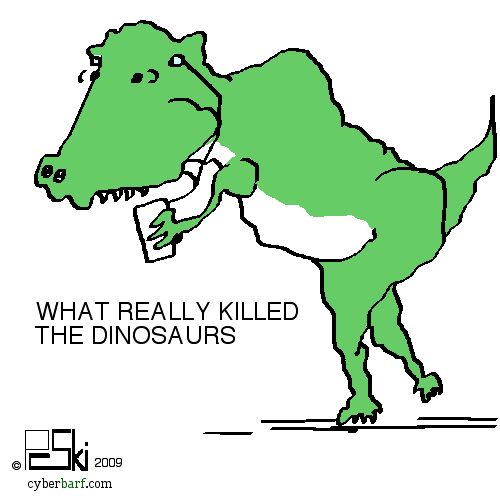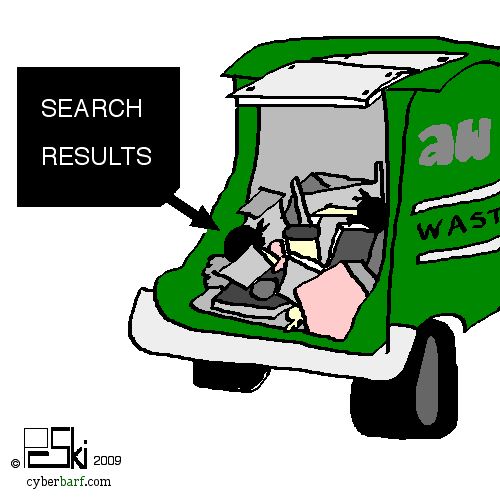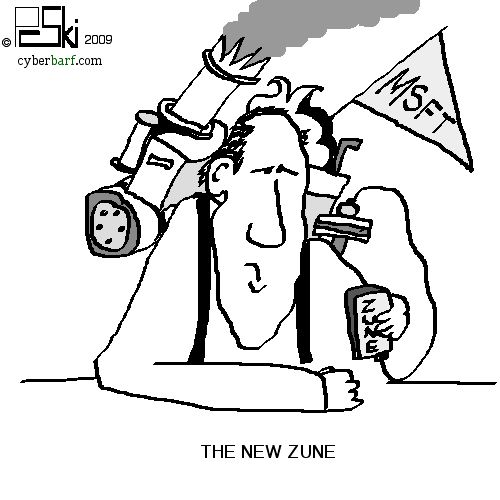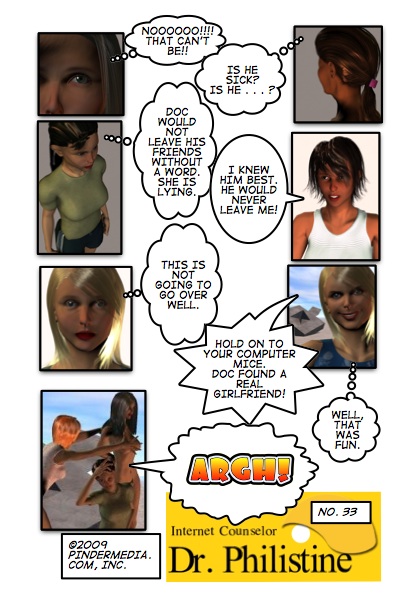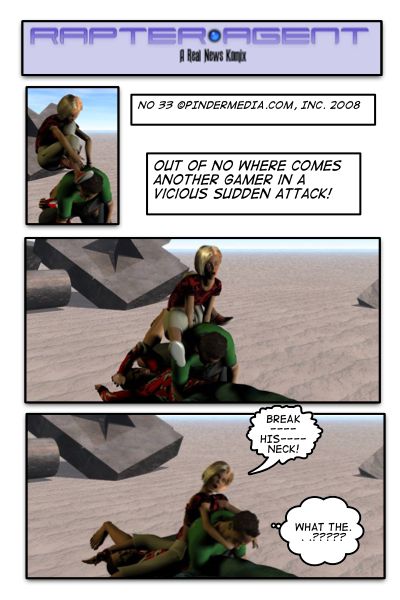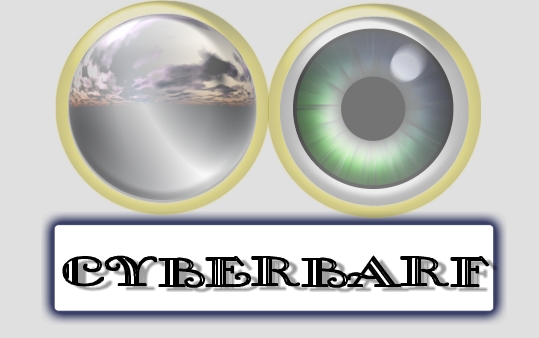|
cyberbarf9.3 EXAMINE THE NET WAY OF LIFE OCTOBER, 2009 IN THIS ISSUE: BING, BAM TO THE MOON BLOATERS WHETHER REPORT iTOONS CLOUDY WITH A CHANCE REAL NEWS KOMIX ROAD STATIC |
 |
 |
 |
 |
|
cyberbarf BING, BAM TO THE MOON IMPRESSION There was a legendary comedian, Jackie Gleason, who can be found in UHF syndication screaming at his sit-com (the Honeymooners) wife, “Bing, Bam, Zoom, I'll send ya to the Moon!” It was a comic reference to end his losing an bitter argument to his stage wife. In today's internet context, the bitter current argument continues to be search engines. The humble search engine started off as the index or table of contents for the entire global web file structure, based upon keywords and metatags. Type in any topic in the box, and you find hundreds of pages of search results. Some on topic, some off topic, some out in left field. It quickly became the all-in-one Swiss army knife for navigating the internet. The early search engines were yahoo, lycos, altavista, excite to name a few. Then in the hype of the first Internet stock bubble, investment bankers were keen at pushing revenue sources from search engine applications. Google was the first firm to really enslave the advertising aspect of its content search results pages. It skyrocketed to the top search engine company through affiliations and hard ball marketing techniques which critics found unseemly: like telling businesses that for a fee it would list them at the top of search page results. It was like being listed first in the yellow pages. Some competitors even objected to misdirection links: if someone searched for Company A then search firm would use that request by re-direct the user to competitor Company B. The general public never realized that a simple directory could be manipulated to give misleading results. Everyone just assumed that a super computer was instantaneously aggregating every web page and compiling thousands of page links in a matter of moments. An unfeeling, unbiased and objective search page results. Every decade or so, there are new players trying to move into the search engine space. Google is still top dog, and it is still trying to dominate everything on the net, from web advertising to republishing every book ever written. When bing.com first launched, a quick test of its search abilities came back lackluster. You can tell that search companies do pour money into updating their data bases and algorithms to gather the most compelling results possible. Bing could be described as a slow, out of date crooner. Now that a few months have past, and with bing making a combination move with a seasoned search engine company, bing.com has moved up to a second tier type of engine service. There is an annoying feature of the bing site: images. When you open the image search page, bing has started you off with pictures from a random file base like national parks, or India before you even type in your request. If one is opening up an image search base, why would one stop that search to look at bing's random offerings? The other heralded search engine is Wolfram Alpha. Now, creators of this site said that it would be doing searches totally different than the current model. It would use intuitive and scientific review of the search requests to determine the best search results to the inquiry. Most people test a new search engine by typing in their own name, their business, or their grand hobby. Putting any of those items into WA would lead not to search results, but another question: did you mean X? No, I did not. If you rephrase the inquiry, you get another question: did you mean Y? No, I did not. Unless you put in a detailed, specific mathematic or scientific problem, the WA data processors have no clue what you are talking about; it is like unless they have programmed the solution into the data base before the inquiry is made, no results will be given. Every single personal attempt at WA has returned utter garbage or no results. So, yes, one could say that Wolfram is a different kind of search engine . . . the non-search search engine. By comparing the new engines to the also rans like altavista or lycos, those older search engines are probably better than the new ones because they follow the consistent, known search-result formulas. Internet search is still defined by two real players: Google and Yahoo. Now, Google has been criticized even more recently by commentators because it has programs that record every individual's search requests. Some believe that Google does this in order to data mine a person's interests, then spam advertise them in the future or sell marketing lists to companies. It is also shocking to some that Google's aggregating of personal information has been readily turned over to government investigators. This drives personal privacy advocates up the walls of constitutional justice that both private and public entities are spying on citizens, then using personal data for their own devices.
|
|
THE NEW CYBERBARF TEE-SHIRT IS HERE AT THE PINDERMEDIA.COM STORE!
THE INTERNET ZOMBIE T-SHIRT IS ON SALE NOW.
|
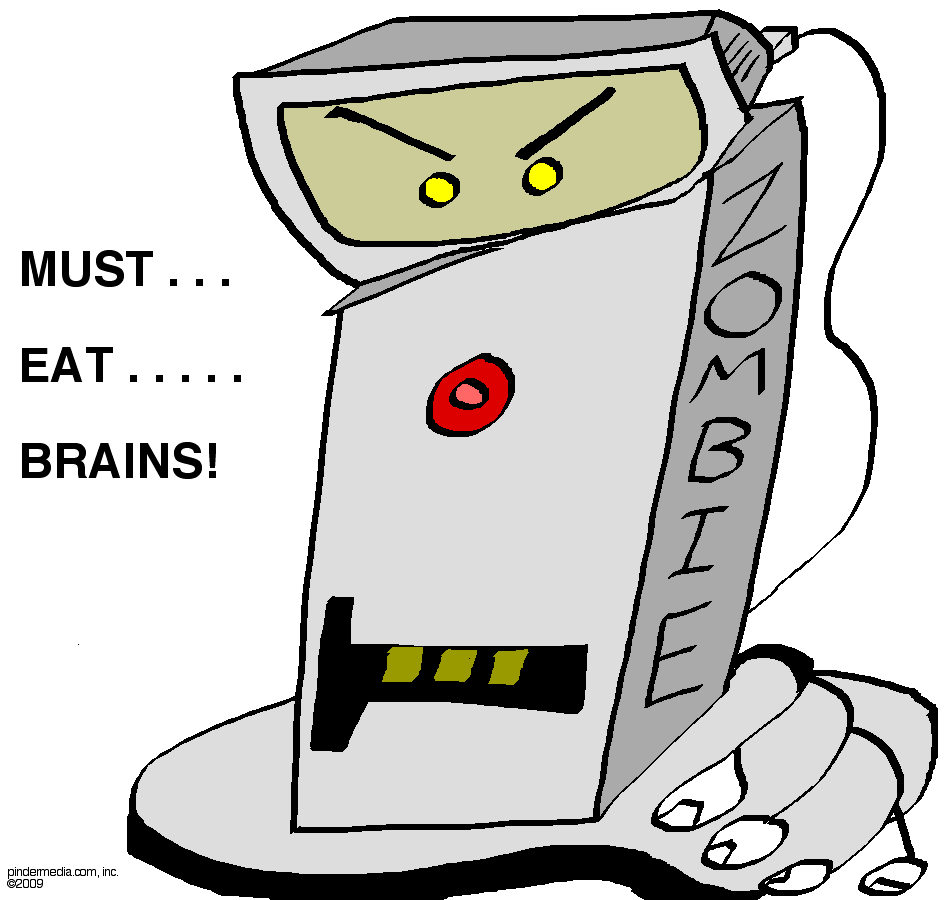 |
|
cyberbarf BLOATERS COMMENTARY Have you ever used ALL of the features of your computer program? For example, under the File menu of my web page design program, I have only used 6 of the 21 commands, a random 28 percent of the features, just on that one pull-down list. Or, you basic cell phone. Send, receive calls, check voicemail okay . . . but ringtones, games, calculator, notes: those features have never been used by this non-tethered 24/4 phone user. Even phone-addicts probably have not used all their phone functions. It is why computer programs are so fat (big) and memory hogs. Every update is expected to pack in more and more NEW features, whether they make any practical sense. Some coder or engineer or marketing geek just needs to think it is COOL whether is it actually useful. That's what sells . . . new things. You open Office 2008 just to type a simple letter and get bombarded by more menus, settings and options that you would think that you might accidentally turn of the NORAD radar system. This bloated program takes time to load, save and navigate files. The first word processing programs mimicked the typewriter: a blank page, a font menu, a font size menu, paragraph and line spacing. What more does one need in order to type a simple business letter? But over time, humble word processing program expanded to take in graphs, charts, tables, pictures, graphics and hyperlinks. The problem with the unwieldy computer program is in direct lockstep with the dropping cost of computer hard drive space and memory prices. Instead of re-inventing the wheel, programmers merely piled on new elements, new modules, new subroutines. Bloat: adj: 1. to swell, as with water or air; 2. a drunkard (slang); 3. a swelling of the abdomen caused by watery foods and eating too fast (in veterinary medicine) Bloat: verb: to cure or preserve (herring, etc.) by soaking in salt water, smoking and half drying. Bloater: noun: a fat herring or mackerel that has been bloated or cured. The example of the wayward word processing program is part of the problem of trying to be-all end all instead of being excellent at a specific task. Word programs tried to morph into page layout programs like Quark or Pagemaker. A page layout program is focused on page design and not word formatting, and word programs were focused on simple text application. Even though the concept is similar in putting words on a blank page, the underlying foundations are not the same. So word processors importing page lay out features usually have inferior page components. Likewise, page layout programs who boast of premium word processing features usually inferior to their pure word competitors. It may be the law of diminishing returns at work. To build on the previous story reference, large comic Jackie Gleason once said: “The other day I got on a weighing machine that stamps your weight on a card. When the card came out, it said, 'Come back in ten minutes - - - alone.'.” There is a difference between being robust and rotund. The whole system of upgrades over blowing up a program to rebuild from scratch is a matter of cost and monetizing legacy code. Microsoft has never rewritten its Windows software but merely reconstituted upgrades on the basic OS shell. Apple has periodically blown up its operating software systems, making it incompatible with older computer hardware. The difference between those two manufacturing modes is that Microsoft holds on to its core program like a bible because it is primarily a software company while Apple is both a cutting edge hardware developer and a software company. In any event, developers always cast the hook to keep these fat bloater programs viable by adding new file types that are not compatible with past versions, like xhtm .docx extensions. Holy mackerel, you have to pay to update to open email attachments. Holy mackerel! |
 |
 |
|
cyberbarf THE WHETHER REPORT |
cyberbarf STATUS |
| Question: Whether federal health care reform will result in massive breaches of medical privacy to citizens? |
* Educated Guess * Possible * Probable * Beyond a Reasonable Doubt * Doubtful * Vapor Dream |
| Question: Whether Apple will ever meet the rumor site cries to sell a cheap netbook? |
* Educated Guess * Possible * Probable * Beyond a Reasonable Doubt * Doubtful * Vapor Dream |
| Question: Whether animation companies streaming shows on their own web sites will help stop unauthorized posting of fan-subs? |
* Educated Guess * Possible * Probable * Beyond a Reasonable Doubt * Doubtful * Vapor Dream |
|
cyberbarf iTOONS
|
|
cyberbarf CLOUDY WITH A CHANCE . . . COLD FRONT In the midst of trying to reconstruct a friend's computer life, there is a haunting problem of how some people are dealing with their personal data files. There are those who back up everything from their hard drives, both personal and financial information, for archives. There are those people who don't back up regularly, but keep everything on their trusty computer hoping for the best. Then there are those people who have drifted into the cloud computing world, where their applications and their data are accessed from their computer, but all the information is stored with the service provider. The problem with the last option is that the person who uses the cloud computing services may or may not keep electronic copies of his files on his own computer. And this leads to the storm cloud vortex when trying to reconstruct the personal data of a person. The files on his computer could have never been made; the files could have been erased; or the files could have been created and stored off-site. If the files were never created, then you are boned because you can't re-create something that never existed in the first place. If the files were erased, intentionally or unintentionally, there are computer software reconstruction programs that can be run to extract lost files. If the files were created and stored with a cloud computing firm, then one has to try to find who, what, when, where and how those personal files flew into the Internet ether. Most use your normal Internet browser to connect (not a dedicated program or bookmark), so you may not have a starting point to map your investigation. The simple task marketed by cloud computing is that the company will hold and store your data files so they will never be lost. Except, if you don't keep a copy, or tell someone your data base provider, access codes and passwords, the files may exist but they can never be accessed by anyone. Even if one uses off-site programs and data base/back up firms, you need to keep your own hard copies of your personal records. We are talking about some technophiles going totally paperless: on-line banking, on-line tax preparation, on-line tax payments . . . but in order to protect yourself from database errors, disputes with your service provider, and readily accessible copies of your check ledgers, financial statements, and tax returns, you should download and print hard copies of these materials just for personal reference in the future. There may be times when your family, accountant, tax preparer or power of attorney will need to access this information and you may not be available to help them retrieve it. Cloud computing has the aspect of being totally in the dark without common sense personal back up copies in your own possession.
|
 |
|
cyberbarf
|
REAL NEWS KOMIX
|
|
cyberbarf ROAD STATIC HIGH TECH PLAINS There is a lot of open road from suburban Chicago to Bozeman, Montana. The tranquil pastoral setting of rural America farm fields, to the sage brush and rocky badlands of the old west, to the peaks and valleys of the mountain ranges. One finds that middle America is still very conservative: 1950s conservative Local radio stations, except for a few public radio outlets in the liberal metro areas, have a constant program diet of conservative talk radio shows in between local swap meet banter and local obituaries. Country music, religious programs, talk radio and modern country music are the top formats. In order to experience a road trip, one must accept the locality and its culture in order to understand it. Like those wacky Wall Drug billboards in South Dakota that have the old flare of the original BermaShave ads. You also have to get used to the pace of middle America is different from suburbia. Like those interstate gas stations out in no where that actually close in the early evening to the surprise of a traveler low on petro. There are some spots along the way, like on US 212, where you may only have one or two radio stations in range to be the soundtrack to the dwindling herds of cattle and sheep that dot the landscape. You hear a local announcer lament that there is another steer farm auction set for the weekend because another operator has closed down. All the equipment, fixtures, tractors and machinery is for sale. Traveling through southern Minnesota, you come across the state mandated alternative energy program. Dozens of new modern windmills are aligned in rows, but with only three or four actually working as their blades slowly turn in the breeze. Why? Because these new windmills have large motors that need to be maintained and serviced in order to function properly. Politicians forced them to be put up without thinking on how to maintain them. Then once you get in range of Nebraska stations, their politicians are demanding a trillion dollar new electrical grid to connect their new windmills to other markets. The average person just shakes their head in the disbelief over these new technologies being forced down their throats and wallets. In the upper Midwest, people still believe in their own self-sufficiency which includes their own power and water resources. People still have burn pits of 55 gallon steel drums in their backyards in lieu of garbage pick ups. The communities off the interstates have the worn age of constant boom and bust agricultural and energy cycles. There is little evidence of new manufacturing or assembly plants in these areas. Old gravel pits and refineries are still operating in their old ways. There was plenty of truck traffic transporting new heavy machinery and equipment so maybe there is an economic rebound around the corner. You go into a community like Chamberlain, SD, on the banks of the Missouri River, and find the only new buildings in the downtown four block area is a McDonald's and two national banks. The rest of the street has the same facades from the early 1900s. There are three thrift stores, a woman's clothing store, an old theater which still has first run movies, one closed bar and a boarded up old city hall building. One gets the impression that the downtown area is merely holding on like garden vines in the fall. The motor lodges had barely basic cable to offer; and any Internet had the unmitigated warning that there is no firewall protection against viruses or malware. It made one keep their laptops in their cases. It is like the rural areas were aware of the advances in technology, but did not embrace them like the metro areas or the college towns. There is a hardy respect for family, friends and work ethic. There is also an inbred western ethic of not throwing out things, no matter how broken, rusty, unusable or weird. The landscape is littered with tractors or trucks that are left where they stopped working in the oddest places. Then there was the stoppage of all traffic on the interstate, for a lone man on horseback driving his cattle across the busy highway to the next pasture. So there are still low tech cowboys working the ranges in the 21st Century.
|
THE STEAM PUNK SPECIAL EDITION featured new Music from Chicago Ski & the (audio) Real News:
(mp3/4;14 length)
